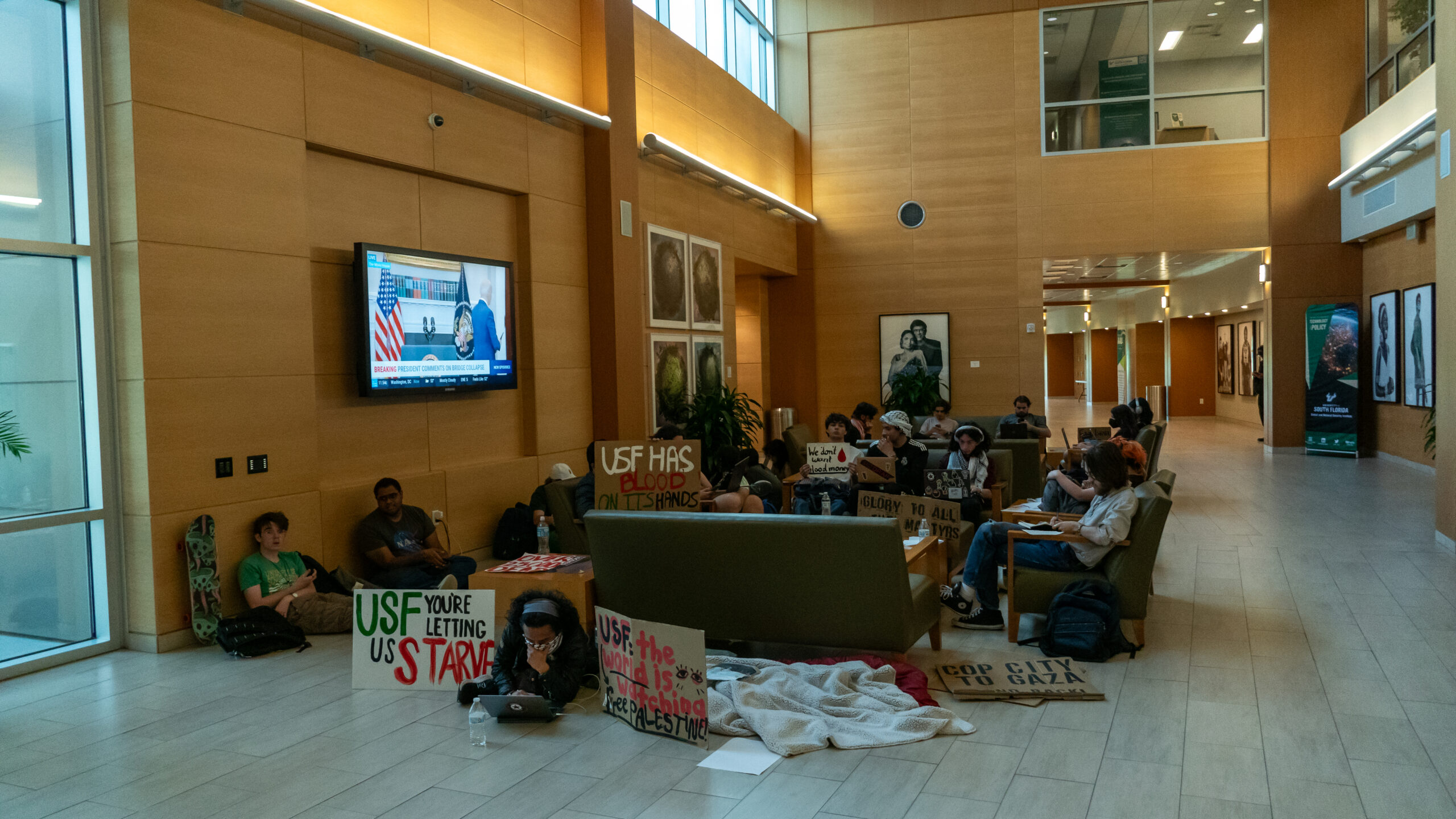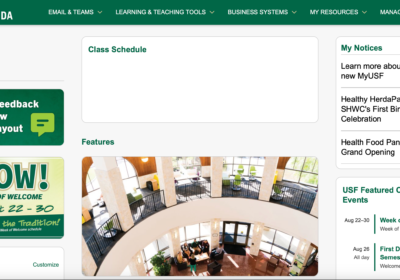Protesters at USF need pre-approval to gather with amplified sound and displays

After several protesters were arrested in late April, USF administration amended its Student Code on Conduct policy regarding on-campus gathering.
The updated policy – 6-028 – requires that organizations reserve a space to gather on-campus ahead of time if they plan to use amplified sound, which includes elevated voices or volume, or displays.
This reservation process starts around 14 to 30 days before the event depending on where the organization wants to gather.
Dean of Students Danielle McDonald said administration had a difficult time navigating the policy last spring and, with the expectation of an “active” fall, wanted to clarify some gray areas.
“We wanted to make sure that we were prepared and that the campus was prepared and understood what the policies were for the university,” McDonald said.
With the upcoming presidential election and anniversary of the Oct. 7 attack, amending this policy was even more pressing, she said.
USF is one of many universities across the country that reviewed its policies after protests advocating for divestment in companies that support Israel commanded headlines in spring.
At the end of April, law enforcement arrested 13 protesters at a couple of campus demonstrations after they refused to leave the area at the 5 p.m. deadline set by USF administration.
Tampa Bay Students for a Democratic Society (SDS) said the changes to the policy felt targeted. SDS is no longer a registered student organization after being expelled for Code of Conduct violations related to the April protests.
“When asked why, [administrators] struggled to show us policies stating campus activities must end at this time,” SDS wrote in a statement condemning the policy on Instagram.
Related: Pro-Palestine encampment protest at USF broken up by tear gas – The Oracle
McDonald said the updated policy provides the needed clarity.
Students have always had the option, and been encouraged to reserve a space to organize on-campus, McDonald said.
The new policy outlines the Reserved Activity Request Process that can be filled out to reserve a space on campus.
After filling out the paperwork and sending it to the appropriate contact, which changes depending on where the event is planned, students will receive feedback. If the event needs to be modified for safety or other concerns, the administration will make those suggestions.
The reservation process also allows USF to send necessary staff to the event, according to McDonald.
Additionally, if an organization requests University Police presence through the reservation process, the organization will foot the bill for law enforcement.
“Our goal is not to make it so expensive that somebody can’t have [the event], but also to make sure that we are able to staff it appropriately,” McDonald said.
Registered student organizations can tap into a fund run by Student Government throughout the year to help with the cost, which is determined on a case-by-case basis.
However, if the university decides law enforcement is needed to protect the USF community during the event, the organization might not be responsible for the cost.
Ryan Ansloan is a senior program officer of policy reform for the Foundation for Individual Rights and Expression, a non-profit group dedicated to protecting First Amendment rights. One concern he had was students’ ability to organize quickly.
“We definitely feel that students should be able to gather spontaneously and express themselves as it’s really the only way that you can react to fast emerging news stories and developments across the world,” he said.
If students want to gather without a reservation, they can do so during business hours between 7 a.m. to 5 p.m., without amplified sound or additional structures, according to McDonald.
Last year, one of the first student protests expressing solidarity with the Palestinian people came just five days after the Oct. 7 attack. Students chanted as they marched across campus toward their landing spot outside the Library. With the new policy, this use of amplified sound is not allowed without a reservation.
Related: ‘We knew we had to do something’: USF students rally to show solidarity with Palestine – The Oracle
Ansloan said universities have the right to propose time, place and manner restrictions, but that the 5 p.m. proposed deadline is too much of a “one size fits all” approach.
Another obstacle would be if another organization has already reserved the spot. Then, the organization gathering without a reservation would have to move and cannot disrupt the reserved event.
McDonald said USF does not yet have a centralized way for students to find what spaces are reserved at certain times without calling the area’s contact. However, it is something the administration is looking into.
Related: USF can place protest restrictions, First Amendment expert says – The Oracle
Changes to USF’s policy was not limited to gathering, however. The Diversity and Equal Opportunity-Discrimination and Harassment policy was also amended this summer to offer specific definitions of Islamophobia and antisemitism.
In their welcome back emails sent out to the USF community on the first day of classes, both McDonald and Law explicitly condemned Islamophobia and antisemitism and pointed students to this amended policy.
“It is important for me to reaffirm that the safety and well-being of the university community is our highest priority,” Law wrote. “As part of our commitment to provide a welcoming environment, we urge everyone to do their part to ensure that USF is a place where we always treat each other with respect.”
McDonald said engagement and activity at USF is encouraged, but it has to be done safely.
“We’re always happy to help students plan it in advance and to make sure they can be as successful as possible, because that’s our goal,” McDonald said. “We want to make sure that these events are successful.”







